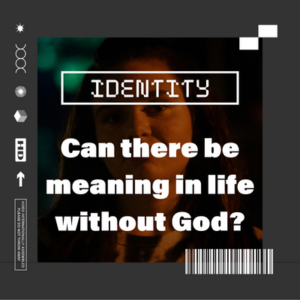
In a limited, temporal sense, yes. But in a wholistic, eternal sense, no. You probably know people who don’t believe in God or follow him who seem to have meaningful lives. They love their families, they contribute to the greater good of society, they do honorable work, they help their neighbors now and then. But their story is viewed as a small one, not as a part of a greater, eternal story. They have their joys and sorrows, their victories and defeats; they live, they die, and they are gone.
Thousands of years ago, a man whose name or title was Qoheleth (some say this was King Solomon) recorded his existential search for meaning. We recognize his story as the book of Ecclesiastes, which today might be subtitled, “Been there, done that, now what?” Qoheleth was a man who had much, experienced much, and hungered for even more. He had wives. Horses. Education. Power. Opportunity. But again and again, he summed up his existence by saying, “Vanity of vanities, all is vanity.” The word translated “vanity” literally means vapor, and it conjures up a picture of something fleeting and elusive, not something solid and satisfying.
Qoheleth concluded that without God, life is meaningless. Apart from him no larger, epic story exists that has true and lasting purpose—only a blank, finite page on which to create our own tiny, temporary story. We need something beyond ourselves and bigger than ourselves to give our lives eternal meaning. Without God, we have no reference point from which to see the bigger story, and we are bound to nothingness, or vapor.
“God made us,” wrote C. S. Lewis: “invented us as a man invents an engine. A car is made to run on petrol, and it would not run properly on anything else. Now God designed the human machine to run on Himself. He Himself is the fuel our spirits were designed to burn, or the food our spirits were designed to feed on. There is no other. That is why it is no good asking God to make us happy in our own way without bothering about religion. God cannot give us a happiness and peace apart from Himself, because it is not there.”1
No true meaning for humanity exists without Jesus. There is no ultimate purpose or goal for the human person apart from him. We are people made for God; fallen from God; and made whole by God in Christ. As the writer of Colossians says, “He is before all things, and in Him all things hold together.”2 Jesus is the exact image of the invisible God 3 whose image we also bear, and joined with him we become new creatures 4 in God’s everlasting story of redemption.
1. C. S. Lewis, Mere Christianity
2. Colossians 1:17
3. Colossians 1:15
4. 1 Corinthians 5:17
Psalm 8:4-8 “What is mankind that you are mindful of them, human beings that you care for them? You have made them a little lower than the angels and crowned them with glory and honor. You made them rulers over the works of your hands; you put everything under their feet: all flocks and herds, and the animals of the wild, the birds in the sky, and the fish in the sea, all that swim the paths of the seas.”
Ephesians 2:10 “For we are God’s handiwork, created in Christ Jesus to do good works, which God prepared in advance for us to do.”
Video Segment: (6:22 – 6:43) “We can attempt to find meaning for ourselves, but it’s like building a sandcastle at low tide, knowing that hours later all your work will be erased. Because if there is no God, we’re nothing more than atoms and molecules. But if there is a God, our lives have ultimate meaning.”
“The naturalist says we come from nothing by chance occurrences of evolution, will die, and go back into nothingness? Is this all there really is? Christianity says we are here by God’s will and design, and our purpose is to glorify Him, enjoy him forever, and do his will while trusting him during our lives. It says we can have a personal, meaningful relationship with God himself through Jesus Christ.” ~Francis Schaeffer
“What do we make of the longing that we have for [meaning, love and beauty]? It is hard to account for these longings on purely materialistic grounds. Reducing love and beauty to chemicals being released and neurons firing seems unsatisfactory. There is a hunger we have that the choicest food, music, and sex fail to fully satisfy. With a longing so strong that this world fails to satisfy time and time again, perhaps we should be open to the possibility that there is more to reality than the physical realm.”~ Tim Keller